
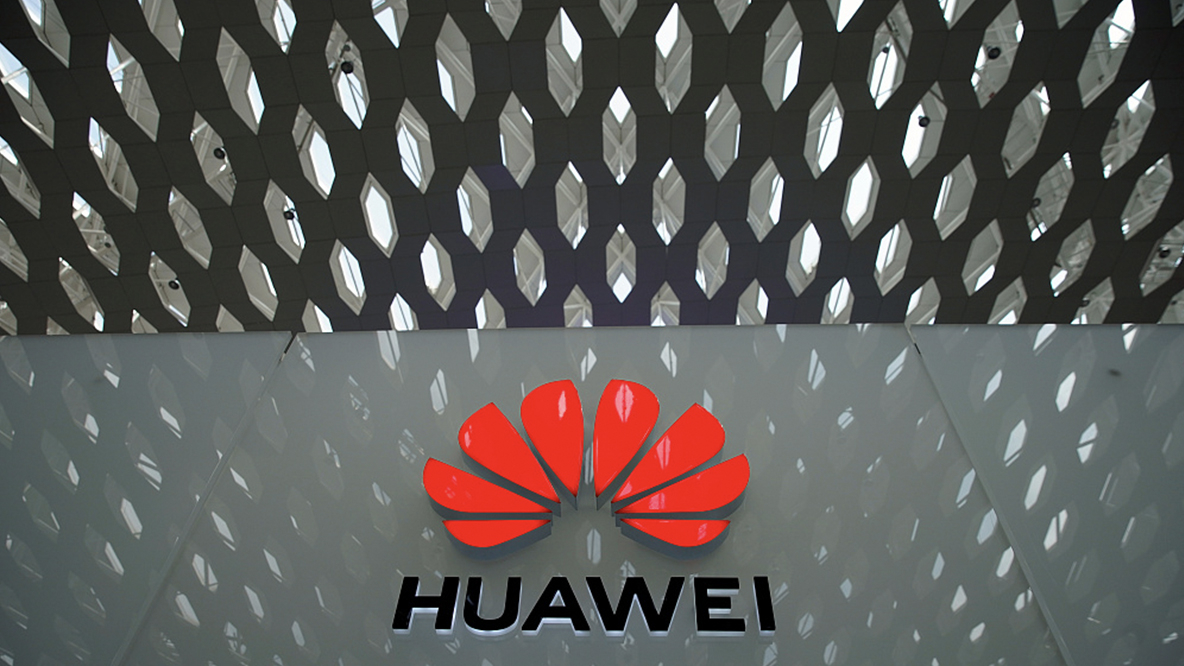
Beijing on Tuesday rebuked as "utterly false" a report by Wall Street Journal (WSJ) alleging that employees of Chinese telecoms giant Huawei Technologies Co. helped governments in Uganda and Zambia spy on political opponents leading to dozens of arrests in both African countries.
Huawei denied the allegations in a letter sent to the American business-focused newspaper, while Ugandan and Zambian governments have refuted the WSJ report as "malicious."
"The flawed report by the Wall Street Journal is quoting words out of context, full of loopholes and devoid of the support by facts and evidence. Such irresponsible reporting from the Wall Street Journal, a mainstream international media agency, makes one worry about its professional standards," Chinese Foreign Ministry Spokesperson Geng Shuang said at a press conference on Tuesday.
"African countries know only too well what they want and care most about their own interests and security. They need no one else to worry about that. Any attempt to viciously smear China and deliberately undermine China-Africa cooperation is destined to no avail," he added.
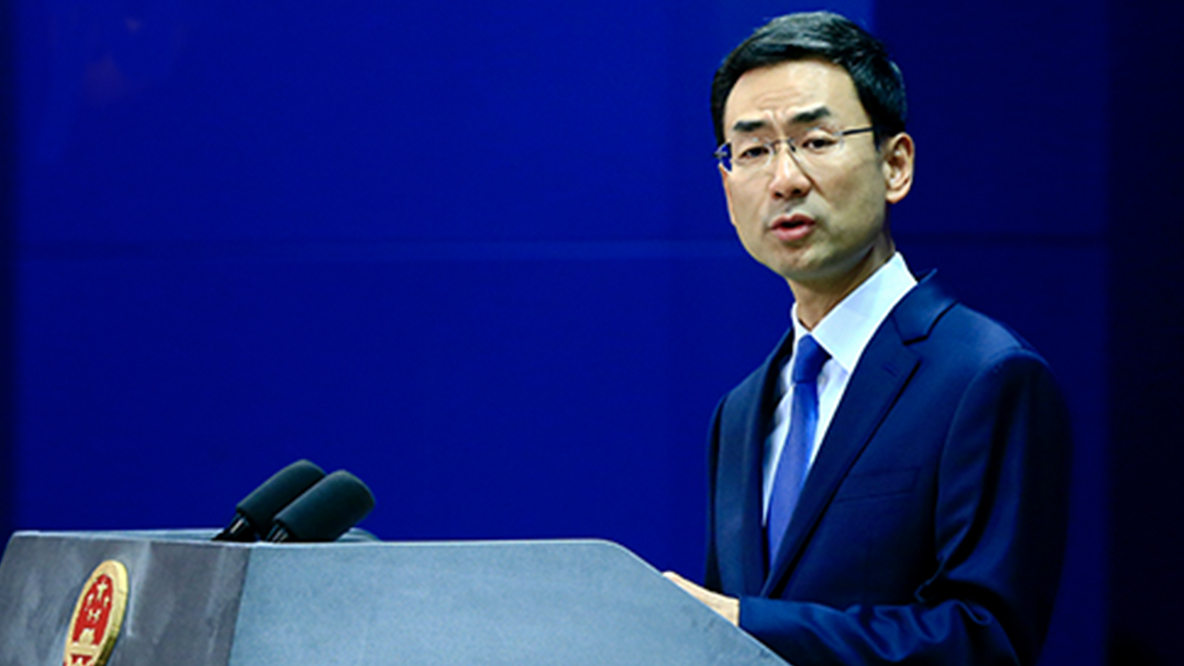
Emphasizing that China's technological support to African countries enjoys local public support, Geng questioned the rationale of the "spying" accusations against the Chinese firm when similar technologies are widely used by the U.S.
"Here I must say that at the request of some African countries, China has enhanced bilateral cooperation with these countries in areas including police service and security, and helped build 'Smart City' and 'Safe City.' This helped improve social security and business environment and has won wide acclaim by the local people," he insisted.
"Using modern technology and products to improve the social governance is a common practice of the international community. Similar technologies and equipment are widely used in the United States. Then why does the Wall Street Journal describe it as 'spying on political opponents' when they are used in other countries?" Geng wondered.
The Chinese reaction came after the WSJ published an “investigative” report on August 14 that claimed technicians from Huawei “in at least two cases, personally helped African governments spy on their political opponents, including intercepting their encrypted communications and social media and using cell data to track their whereabouts.”
The article also reported that Huawei operated a video and cyber surveillance system in Algeria, which the company denied.
Huawei rejected the "unfounded and false allegations about its commercial operations in Algeria, Uganda and Zambia" in a letter to the WSJ on August 16.
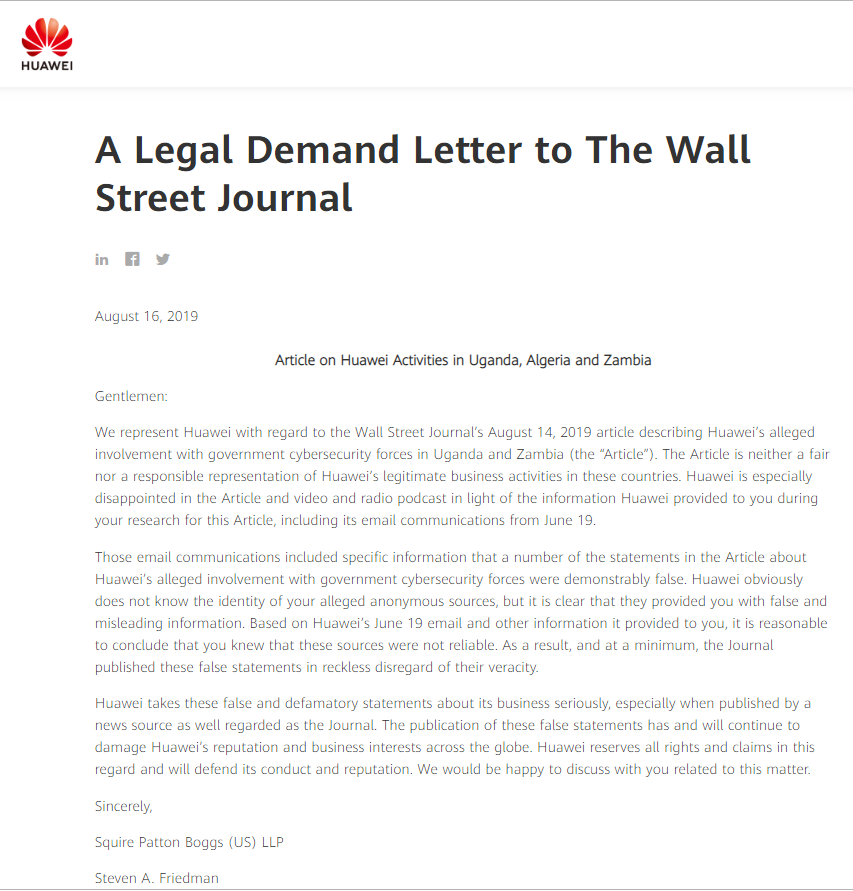
A screenshot of Huawei's letter to the Wall Street Journal, posted on the company's official website. /Photo via Huawei
"The article is neither a fair nor a responsible representation of Huawei’s legitimate business activities in these countries. Huawei is especially disappointed in the article and video and radio podcast in light of the information Huawei provided to you during your research for this article, including its email communications from June 19,” Huawei said in the letter signed by the firm’s lawyer Steven A. Friedman.
Accusing WSJ of publishing "false statements" from "anonymous sources" in "reckless disregard of their veracity," Friedman stated that the publication of the article "has and will continue to damage Huawei’s reputation and business interests across the globe."
Both Zambia and Uganda promptly denied that Huawei employees had helped them conduct espionage. The Algerian government hasn’t responded on the controversial claims yet.
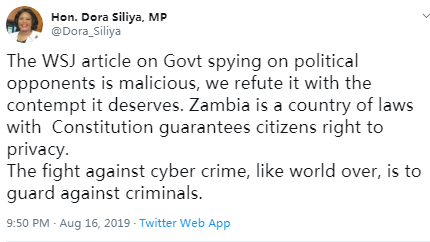
A screenshot of Zambian government spokesperson Dora Siliya's tweet. /CGTN Photo
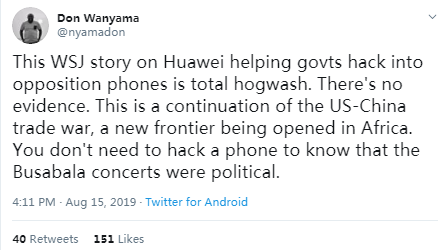
A screenshot of Ugandan presidential spokesman Don Wanyama's tweet. /CGTN Photo
"The WSJ article on govt spying on political opponents is malicious, we refute it with the contempt it deserves," Zambian government spokesperson Dora Siliya said on Twitter on Friday. "Zambia is a country of laws with Constitution guarantees citizens right to privacy."
Ugandan presidential spokesman Don Wanyama said, “the WSJ story on Huawei helping govts hack into opposition phones is total hogwash. There's no evidence.”
Wanyama also said the report appeared to be a continuation of the U.S.-triggered trade war and “a new frontier being opened in Africa.”
The US government has been accusing Huawei of being a potential agent helping the Chinese government to spy on other countries since 2012. The Chinese telecoms company has vehemently denied the allegations.

Copyright © 2018 CGTN. Beijing ICP prepared NO.16065310-3
Copyright © 2018 CGTN. Beijing ICP prepared NO.16065310-3